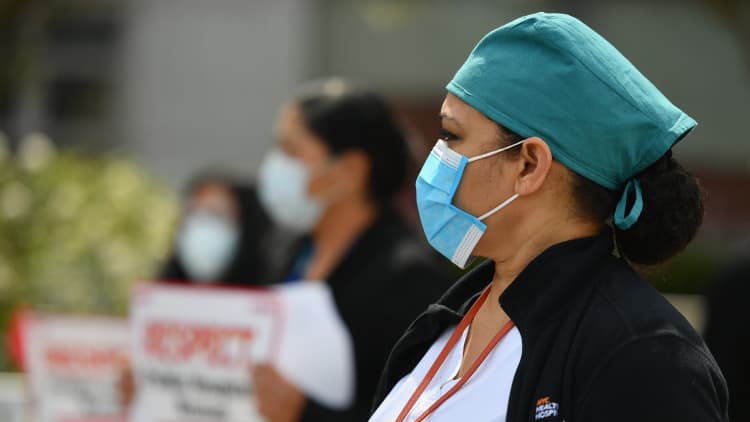When 57-year-old cancer survivor Sandra Rivera Del Valle started to feel sick last month, she faced an impossible choice: Risk her health or forgo her paycheck.
Rivera Del Valle chose to stay home from her job as a plane cabin cleaner in Orlando for two weeks, unpaid, in quarantine. When she tried to come back to work, she was laid off.
"If I do not get any money, I'll be on the street with my family," she told CNBC in Spanish through a translator.
Essential workers across the country like Rivera Del Valle are struggling to get access to paid sick leave, even after a federal law required employers to provide the benefit for Covid-19 reasons. With unemployment skyrocketing, especially among Hispanics and African Americans, many are continuing to go to work even if they feel sick out of fear of losing their jobs.
"At the end of the day we have workers, particularly these essential workers, who are going to work, some of them may be going to work not feeling their best, because they have to get a check," said Keshia Pollack Porter, a professor at Johns Hopkins Bloomberg School of Public Health.
Unemployment surging
Josefina Garcia, a janitor in Harrisburg, Pennsylvania, said she was fired after she called out sick in April and is now struggling to find a new job.
"Right now there's not enough options to work," she told CNBC through a translator. "I'm hoping that when the virus passes the situation will improve."
Government data released Friday showed the unemployment rate among Hispanics and Latinos more than tripled from March to April to 18.9%. Employment in the services sector has been particularly hard-hit, with service jobs accounting for more than 17 million of the 20.5 million job losses in the month of April.
Dalia, who did not want to give her last name out of fear of losing her job, is a cleaner in Pennsylvania and a mother of two. She said employees like her have no choice but to go to work, even when they feel sick.
"There are a lot of people who don't have work," she said. "Nothing is safe right now," she added.
Paid sick leave
Many workers who do choose to take sick days amid the coronavirus pandemic are giving up their paychecks during that time. Roughly 1 in 4 Americans does not have access to paid sick leave, according to 2019 data from the Bureau of Labor Statistics.
Jackeline Bonett, a janitor in Miami, said she gave up her salary for 15 days as she stayed home in quarantine. She said she made the choice to protect her and her family's health.
Congress has taken some steps to try to address the trade-off between income and health amid the coronavirus pandemic. The Families First Coronavirus Response Act, which went into effect April 1, provides paid sick leave for up to two weeks for workers coping with coronavirus-related issues.
Yet 75% of Americans work for companies that qualify for exemptions from the law. Firms with more than 500 employees were excluded from the paid leave mandate, while small businesses with fewer than 50 employees are also able to apply for exemptions.
A new study by a group of economists from multiple universities analyzed cellular data to examine the effects of the law on employees' abilities to stay home from work. It found the number of people working full-time immediately decreased by 17.7% in the first three weeks the law was in effect, while the number of people staying home immediately increased 7.5%. These changes in full-time work and staying home dissipated within three weeks.
Catherine Maclean, a co-author of the study and associate professor at Temple University, said those figures might have been even bigger if there weren't so many exemptions in the law.
"If more people were eligible, you may have seen more changes in individuals' behaviors in terms of their physical mobilities," Maclean said.




